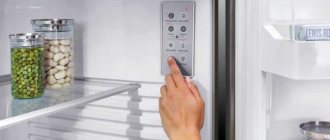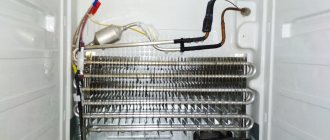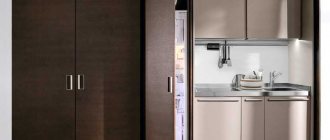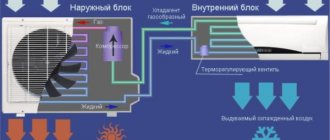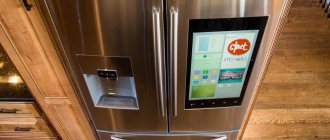- Refrigerator repair
- Note to the hostess
The main problem of many Russian apartments is a small kitchen. Therefore, when buying a refrigerator or freezer, many are faced with a seemingly insoluble problem - where to put it? And then it comes to mind that you have a completely unoccupied balcony (or loggia), and you decide to install a refrigerator there! But wait... Is it even possible to place a refrigerator on the balcony, and will it work there? Let's try to understand this issue.
What do manufacturers recommend?
One of the important characteristics of a refrigerator is the climate class, which shows at what ambient temperature the normal operation of the unit is guaranteed (read more about this in the article “What does the climate class of a refrigerator mean”). Manufacturers prescribe operating refrigerators in the temperature range from +16 to +32 °C (normal climate class N). Some models can operate at temperatures from +10 to +43 °C (universal climate class SN-T). Failure to comply with these requirements may result in unstable operation of the unit. Moreover, if a breakdown occurs due to non-compliance with the recommended operating conditions, the manufacturer has every right to refuse you warranty repairs.
Conclusion: Operating a refrigerator on an unheated balcony or loggia (even if it is glazed) will most likely lead to a violation of the temperature regime recommended by the manufacturer (in autumn, winter and spring the temperature may well be below 10 ° C, and in summer it may exceed 40 ° C above zero ).
Why use a refrigerator or freezer on the balcony: main reasons
- Exposure to precipitation on an unglazed balcony. When installing a refrigerator on an unglazed balcony, direct moisture on the unit threatens the electrical safety of the entire apartment: this can lead to a short circuit. In addition, in conditions of constant exposure to moisture, corrosion of metal parts is inevitable.
- High humidity. Operating a refrigeration unit in conditions of high humidity can lead to damage to electrical insulation, premature corrosion of metal parts of the refrigerator, swelling of the paintwork, etc. In addition, exposure to moisture can cause damage to the thermostat or control board of the refrigerator (due to oxidation of the contacts).
- Exposure to direct sunlight and high temperatures. Installing the refrigerator in an area exposed to direct sunlight will inevitably lead to fading of the paintwork of the unit - the paint will turn yellow and crack, and damage to plastic and rubber parts. In addition, in the summer, it is possible that the temperature at which the refrigerator can be operated is exceeded, which will force the compressor to work at its limit and may cause it to fail.
- Exposure to negative temperatures. During the cold season, the oil in the refrigerator compressor thickens, which puts additional stress on the motor and shortens its service life. In addition, at low ambient temperatures, the pressure in the line drops, and the freon collected in the condenser is initially unable to leave it. Therefore, the refrigerator motor will run idle for some time to create sufficient pressure. This also leads to overload of the compressor and premature failure.
Freezer on the balcony: pros and cons
A freezer on the balcony can be part of the set
Sometimes, when looking for a place for large kitchen appliances, owners try to use balconies or loggias, including cold ones, to place them. Especially often such decisions are made in small apartments with cramped kitchens.
Devices that are used for freezing food (freezers) usually have a convenient shape and compact size, so placing them in a corridor, on a loggia or balcony does not cause any particular difficulties.
If there is access to a loggia or balcony from the kitchen, this is very convenient, because frozen foods are stored within walking distance.
If the balcony is insulated
A chest freezer can be kept on an insulated balcony even in winter, if the room is heated and the air temperature is positive around the clock.
The technical passport of freezing equipment contains an indication of the operating features, including the ambient temperature at which the use of the freezer is permitted. Almost all brands of freezing equipment must be operated at a temperature of + 15C; failure to comply with this rule will result in failure of the equipment or its rapid failure.
This is explained by the fact that different models of freezers may use compressor oil of a different composition; there are several types: synthetic, mineral, polyvinyl ester or polyester.
The use of a particular type of compressor oil dictates the ambient temperature that must be provided for the normal functioning of the unit.
A refrigerator on an insulated loggia can work the same as indoors
Related article: We grow flowers on the balcony in boxes, pots and flowerpots!
There are several other negative factors that affect the normal operation of a freezer installed on a balcony or loggia:
- Condensation is a phenomenon observed in winter on balconies with insufficient insulation. In winter, if the balcony is not heated properly, condensation may form on the balcony glass and walls, as well as on the metal parts of the freezing unit. Moisture quickly deteriorates the metal parts of the freezer and electrical parts, often leading to a short circuit.
- Excessive humidity negatively affects the coating of the freezer, gradually destroying the enamel layer.
- Ultraviolet radiation - sunlight, acting on the freezer, gradually destroys the rubber gaskets, which, when dry, do not ensure a tight fit of the door. If the unit is overheated by the sun's rays, it will quickly fail. In winter, the impact of ultraviolet radiation is not so noticeable, and in summer it can be easily reduced by shading the balcony with curtains or blinds.
If the balcony is open
There is no place for a freezer on an open balcony
Is it possible to place a freezer on a cold balcony in winter if it is not heated at all or is completely open? At sub-zero temperatures, most refrigeration units simply will not turn on and work. In any case, frost can greatly affect the health of the freezer, so there is no need to take risks.
A freezer on a balcony is exposed to negative effects in winter - high humidity is unfavorable for equipment. An open balcony does not protect the refrigeration unit from exposure to precipitation, dust, or humidity.
In addition, condensate, when interacting with the outer coating, gradually causes its destruction, as well as the emergence of corrosion centers. Based on the combination of negative factors, it is best not to install a freezer on unheated balcony areas, this will avoid many problems, including serious equipment breakdowns.
In winter, a freezer installed on a closed balcony without insulation is extremely negatively affected by condensation that forms due to temperature differences. If the equipment is operated, it may cause a short circuit, which may lead to a fire.
Will the refrigerator or freezer work on the balcony in winter?
The purpose of a refrigerator is to cool; it technically cannot work to heat. Therefore, when the air temperature on the balcony drops to negative values, do not expect that the refrigerator will be warm, it will simply stop working. But with the freezer everything is not so clear. Depends on the design of the refrigerator. And the region of residence also plays a role. Let's look at the possible options.
- Single-compressor refrigerator with independent temperature control in the chambers (drip defrosting system in the refrigerator compartment and manual defrosting or NO Frost in the freezer). Most modern refrigerators are designed according to this principle. The compressor in units of this type is turned on by the “crying” evaporator sensor, which is triggered when the temperature rises to +4 – +10 °C. If the temperature on the balcony or loggia is below these values, the refrigerator, including the freezer, simply will not turn on and fulfill its main purpose.
- A single-compressor refrigerator with one thermostat, which simultaneously regulates the temperature in both chambers of the unit. In refrigerators of this design, the thermostat measures the temperature in the refrigerator evaporator and operates at a slightly positive temperature - from +4 to +7 °C. Accordingly, the behavior of such models is similar to the previous option: when the ambient temperature drops below this temperature, the compressor of the unit will not start and the refrigerator will not work.
- FULL NO refrigerators and two-compressor units. The inclusion of cooling in the freezer compartment of such refrigerators is regulated by a separate temperature sensor located either in the evaporator of the freezer compartment or in the freezer itself. Its cooling mode is activated when the temperature rises to values from -16 to -24 °C (depending on the selected program). Thus, the freezer in such models can easily work on the balcony even in winter (if the frosts in your region are not too severe). However, switching cycles will be rare, and the compressor will experience a significant load (the oil will cool and thicken during shutdown). The refrigerator compartment will turn off at a temperature on the balcony from +4 to +10 ° C for the same reasons as above.
- Freezers and chest freezers. The operating temperature inside the freezer ranges from -18 to -24 degrees (depending on the selected cooling mode). Accordingly, as long as the temperature on the balcony is above the specified range, the freezer will turn on. But no one has canceled the excessive load on the compressor due to cold oil.
Is it possible to place a freezer on the balcony in winter?
To understand whether it is possible to place a freezer on a balcony, you need to study how it works. The household appliance functions as follows:
- First, the motor-compressor starts up and pumps all the vapors created by freon into the condenser.
- The refrigerant condenses and then passes through drying filters to the evaporator.
- The cycle is repeated until the specified parameters are achieved.
- After this, the thermostat starts working and the compressor turns off.
View » Why ice freezes on the back wall of refrigerators: what to do, how to get rid of ice
If the freezer is installed on an uninsulated balcony, and the temperature in this room is negative, then the thermostat will not allow the device to turn on and operate normally.
The functionality of the freezer also depends on the type of oil used. There are several types:
- polyester;
- polyvinyl;
- mineral;
- synthetic.
If the balcony is insulated
Consumers often ask whether it is possible to operate a freezer on an insulated balcony:
- Placing equipment is permissible both on balconies and loggias, provided that the room is heated.
- In the attached instructions you need to study the technical parameters of the equipment, incl. information about the climate class in which the device will function most efficiently (almost all models operate at temperatures from +15°C).
Safety rules must be followed:
- The temperature on the balcony should be the same as in the apartment rooms.
- The refrigerator or freezer should be placed 20 cm from the walls.
- The device requires a reliable outlet to operate (it must work 24 hours a day).
- The wiring must be insulated (to do this, place it in protective boxes).
- The wiring outlet must be kept out of the reach of children and pets.
Open balcony
Often, apartment owners use a balcony or loggia to place large kitchen appliances, incl. open type. Thanks to its compactness, it is not difficult to place the freezer on the balcony in winter, especially if it has access to the kitchen. This is very convenient, because... Frozen foods are stored at a short distance.
However, too low a temperature can not only interfere with the operation of the freezer, but also cause breakdown (especially if the readings are below zero). Most of the freezers sold in the market are not able to withstand the cold. The minimum ambient temperature required for the device to operate must be positive. Otherwise, the coolant may freeze and the equipment will stop working.
For safety reasons, it is prohibited to place a refrigerator or freezer on open loggias or balconies for the following reasons:
- Condensation formed as a result of temperature changes is very unfavorable for both the switched on freezer and the wiring.
- It can cause a short circuit, which can even lead to a fire.
Based on the combination of negative factors, we can conclude that placing freezers on an open balcony is undesirable, as this can cause problems, including complex malfunctions.
Glazed balcony without additional insulation
The freezer provides low temperatures for storing food, but is not resistant to cold, so equipment is not stored in a cold room.
If there is nowhere else to put the refrigerator...
...and you decide to install it on the balcony, know that you do this at your own peril and risk. When choosing a balcony or loggia as a “place of location” for a refrigerator or chest freezer, you must approach this issue from two points of view: rationality and safety precautions. To ensure that your refrigerator serves you for as long as possible, try to follow these rules:
- Decide why you need a refrigerator on the balcony. If, mainly, you are going to store frozen berries, mushrooms, meat, fruits, etc. there, then give preference to the freezer. If you need chilled drinks in large quantities during the hot season, take a look at ST or T climate class refrigerators without a freezer. It will be possible to kill two birds with one stone only in the case of two-compressor models or FULL NO FROST refrigerators. The rest will simply stop working as soon as the temperature on the balcony approaches negative.
- Make sure that the climate class of the refrigerator matches the temperature on the balcony in the summer. If in the summer you experience 40-degree heat on your loggia, then a refrigerator of normal climate class (N), designed for temperatures up to 32°C, has no business there. The compressor may not last even one season.
- If you do not use the freezer, turn off the refrigerator when the temperature on the balcony is below +10 °C. As we discussed above, most modern refrigerators stop working as soon as the ambient temperature drops to slightly positive values. Therefore, you can turn off the unit when the temperature on the balcony drops to +10°C. Thus, you will be able to comply with the manufacturers’ requirements for an operating temperature of + 10°C, and use the refrigerator in the warm season.
- Avoid exposing the unit to direct sunlight. Install blinds on the balcony, hang thick curtains - this will protect the device from heating up and premature destruction of the paintwork.
- Choose inexpensive refrigerator or freezer options. If, after installation on a balcony or loggia, such a refrigerator fails, the monetary losses at least will not be very large. By the way, Russian balconies are often “inhabited” by old Soviet units, the warranty for which has long expired, and which you wouldn’t mind throwing away if they break down.
- Avoid getting moisture on the unit and high humidity on the balcony. For this purpose, you should glaze the loggia and equip a ventilation system (or simply ventilate the room periodically).
Storing a non-working freezer in winter
Sometimes a family needs to store freezer equipment in a non-working state; the best solution is to take it outside the apartment, for example to a loggia, where there is enough free space. Such storage in the summer is possible on open and closed balconies, as well as in winter.
Related article: Methylane wallpaper adhesive, a short review
A non-working freezing unit in winter can be installed even on an uninsulated balcony, you just need to carefully pack the equipment and protect it from moisture and dust.
You should carefully select a place for the freezer where slanting rain, other precipitation, dust and dirt will not reach.
Is it possible to store a refrigerator on the balcony?
But on this issue, manufacturers do not establish any prohibitions. You can store a refrigerator on a balcony or loggia, but, again, two rules must be followed. First, protect your refrigerator from direct sunlight. And secondly, if during the cold season you decide to bring the refrigerator indoors, in order to avoid damage, do not rush to turn it on - let the unit “acclimatize”. This process can take from several hours to a day - during this time the oil in the refrigerator compressor will reach room temperature.
Breakdowns associated with using the refrigerator on the balcony
When operating a refrigerator on a balcony, the risk of various malfunctions occurring is quite high. For ease of perception, we have systematized the most common of them in the form of a table.
| Malfunction and how to fix it | Symptoms of a problem | Price* (labor + spare parts) |
| The refrigerator compressor has broken down. It needs to be replaced. | This malfunction occurs if the unit was operated at temperatures that do not correspond to the operating range specified in the instructions for the unit (this leads to increased load on the compressor). The following signs may indicate a breakdown:
| from 6500 to 10500 rub. |
| The control module has failed. It needs to be replaced or reflashed. | This malfunction can occur when the refrigerator is operated in conditions of high humidity: contacts oxidize and the control board fails. The following signs may indicate a malfunction:
An additional symptom may be a sound and light alarm from the refrigerator, indicating an increase in temperature in the chambers and/or an error code on the refrigerator display (for models with a screen). | Repair – from 3500 to 7000 rubles. Replacement - from 9,000 rubles. |
| The temperature sensor is faulty (temperature regulator in electromechanical models or temperature sensor in electronically controlled models). It needs to be replaced. | Moisture condensation at the location of the sensor can lead to breakdown, which can be indicated by the following symptoms (one or several):
| from 3000 to 6000 rubles. |
| The defrost sensor has failed (in refrigerators with NO Frost). It needs to be replaced. | Damage may occur due to moisture condensation on the sensor contacts. The following signs will indicate a malfunction:
In addition, the malfunction may be accompanied by a sound and light signal, indicating a violation of the temperature regime in the refrigerator compartments. Due to a malfunction of the sensor, the evaporator defrost does not turn on, and the refrigerator freezer is filled with ice. | from 4200 to 6500 rub. |
| The refrigerator door seal has cracked and needs to be replaced. | This may happen:
A dried out seal leads to a violation of the refrigerator’s tightness, warm air getting inside it and an increase in the temperature in the chambers - this “forces” the compressor to work more intensively and can damage it. | from 2500 to 9000 rub. |
* The table shows FULL PRICES for repairs, including the cost of new spare parts and repair work. The final cost of repair depends on the refrigerator model and is determined by the technician only after diagnosis.





